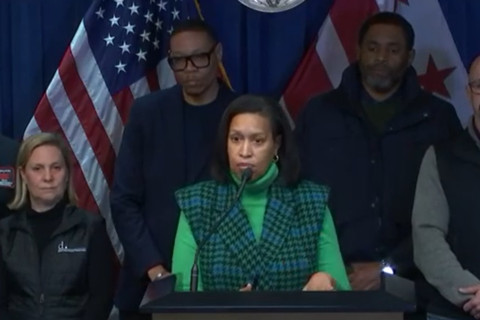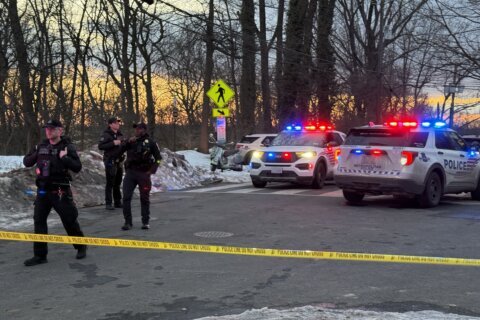D.C. resident Lee Mayer is adamant that putting bike lanes on each side of Connecticut Avenue NW in Ward 3 will be disastrous for businesses in the Northwest neighborhoods of Woodley Park and Chevy Chase.
In an effort to head off the current project, he and members of the group “Save Connecticut Avenue” met with Ward 3 Council member Matthew Frumin on Thursday afternoon.
Mayer said his group includes businesspeople and residents who oppose the proposed bike lanes.
He told WTOP that he left the meeting dissatisfied, accusing Frumin of “repeating the tired and disproven marketing slogans of the bike advocates.”
Frumin’s office said in an email to WTOP that Connecticut Avenue “needs to be safer, greener and more accessible for all road users.”
Frumin’s statement said that he’s “committed to a design that incorporates protected bike lanes and pedestrian safety improvements, while also addressing concerns of small businesses.”
On the issue of safety, Mayer said the D.C. District Department of Transportation has not done enough to deal with speeding along the Connecticut Avenue corridor and he’d be in favor of using speed cameras.
“I think that speed cameras along Connecticut Avenue are totally appropriate,” he said.
The plans being considered by DDOT include a 2.7 mile stretch with the “primary study area” for the proposed bike lanes being between Legation to Calvert streets, which are currently home to a mix of business and residential blocks.
Under the plan, bike lanes would be added to the northbound and southbound lanes of Connecticut Avenue, and a parking lane would be included on one side of the street.
Supporters of the bike lanes, including the Washington Area Bicyclist Association, say the primary goal is improving safety along Connecticut Avenue — not only for cyclists, but pedestrians and drivers as well.
Garrett Hennigan, WABA’s organizing manager, told WTOP that bike lanes don’t necessarily hurt businesses. Instead, he said, when streets are made more accessible to biking and walking, residents “like to come there. They like to eat at restaurants along those streets and they like to spend money.”
But Mayer insists that if the bike lane designs for Connecticut Avenue in the DDOT’s last draft are installed, “You’re going to discourage more people from going to work downtown,” and D.C. revenue will drop. Among the concerns businesses have, he said, was the loss of parking spaces along the proposed bike lane route.
“DDOT plans on removing 469 parking spaces on Connecticut Avenue, and that is just from Calvert Street to Legation Street,” said Mayer.
Hennigan disagrees with the notion that the loss of parking spaces is a losing proposition for businesses.
“It would be actually, an improvement in some ways, going from rush-hour restricted parking lanes, where you cannot park in front of your business or on the same block as a business you’re traveling to, to what is proposed — 24/7 parking on one side of the street for those commercial areas,” Hennigan said.
There is one point on which opponents and supporters of the bike lane agree: both sides have issues with how DDOT has handled some of their concerns, including the timing of the project. In April, DDOT announced that the plans were being revised but a final draft of the plans wouldn’t be done until the fall.
Hennigan complained that he feels there’s been a lack of transparency from DDOT.
“What is the design that DDOT is moving ahead with? We don’t know,” Hennigan said. “There are ways to build safe, protected bike lanes on major streets like Connecticut Avenue, and there are ways to do it badly.”
Mayer, who’s been a sharp critic of the bike advocacy community, told WTOP that in his view “DDOT’s been less than candid with its plans.”
DDOT’s website outlining the project states that throughout 2020 and 2021 “approximately 40 stakeholder and agency presentations took place” and that the first public meeting took place in March 2021. The public comment period ended on May 8, 2021, and Mayor Muriel Bowser and DDOT announced the “preferred concept” in December 2021. That version is now undergoing review.
DDOT’s website adds that as of November 2022, “DDOT has held over 50 opportunities for community and agency engagement.”
DDOT officials say the final plan for the bike lanes will be made public “in the fall.” When asked for a specific date when the revised plans will be unveiled, DDOT public information officer German Vigil said no date has been set just yet.








